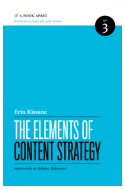What I’ve Been Reading: The Elements of Content Strategy
So let’s not try to tackle an in depth review of Erin Kissane’s The Elements of Content Strategy, because the book itself is very good and we won’t do it much justice other than to say “you should read this if you’re into content strategy and want to get better and need a great little book to keep by your computer.”
What I’ve Read:
The Elements of Content Strategy – Erin Kissane
What we CAN tackle, though, is the process of restraint. The idea that a guidebook doesn’t need to be exhaustive. It simply needs to guide us. Hence the name. Guide. Book.
 Until recently, books on internet design and development were usually thick, barely readable tomes, their weight enough to turn off even the most aspiring practitioner. I suspect this is why web development was a smaller field a decade ago: not because the web was just a showdown away from becoming the Wild West, but because no one could bother to read the damned books that helped explain the process.
Until recently, books on internet design and development were usually thick, barely readable tomes, their weight enough to turn off even the most aspiring practitioner. I suspect this is why web development was a smaller field a decade ago: not because the web was just a showdown away from becoming the Wild West, but because no one could bother to read the damned books that helped explain the process.
That’s not the case anymore. Sure, Information Architecture for the World Wide Web continues to double every few years, but for the most part the important books are becoming thinner, their authors rightfully jettisoning the backstory and getting right to the point.
In the case of Kissane’s Elements, two ideals reign over everything:
#1 – The desire to create something small and usable
#2 – The understanding that the “WHY” has already been covered
This book is dense. It took me two hours to read. It’s packed with “HOW.” Enough “HOW” that it really will get a special spot next to my computer, much like how Strunk and White used to sit just within my reach.
You don’t START with this book. You start with Halvorson. Then you read Kissane. And then, if you can handle the excitement, you turn to the most important part of the book: the appendix, where Erin talks about all of the other great resources, and then you get your boss to order all of the books that sound interesting, and then you get excited to read them, and then you realize the hidden benefits of this book.
That it’s a guide for both “how to do the job” and “how to further your knowledge.” And, in turn, the field.
No kissing ass here, and no hyperbole: this book is one of the good ones. Short. Sweet. Fantastic. Some books make you smarter. This one makes you better. Go read it.